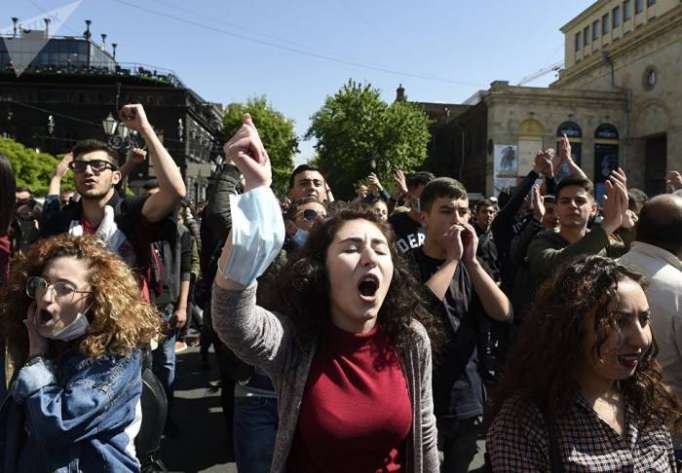The demonstrators gathered after the leader of the protest, opposition lawmaker Nikol Pashinian, told them the previous day to gather in front of the government offices on Republic Square early on April 19 in an attempt to prevent ministers from attending Sarkisian's first cabinet meeting.
Police officials issued a statement on April 19 reminding citizens of the status of "specially protected sites" and warning demonstrators against illegally entering government buildings or other facilities, saying security personnel will apply the "proportionate measures of legal effect."
The police statement also cautioned that in case of an attack or danger of an attack, security forces could use special means, and even weapons, to defend "specially protected facilities."
Pashinian warned that the police had no right to use weapons against peaceful protesters.
The early morning activity follows a night of demonstrations by thousands of Armenians who converged on Yerevan's central Republic Square in protests against the move to allow Sarkisian to retain power after the end of his presidential term.
Police detained dozens of demonstrators as they tried to block streets and interrupt traffic amid daylong protests and marches around the capital on April 18.
Addressing the rally on Republic Square, Pashinian urged people across Armenia to put pressure on local authorities to make statements in support of the protest movement, saying it would help achieve a change of government.
He also called for sit-ins inside administrative buildings and government offices across the country "so that even Serzh Sarkisian himself has no place to sit," and reiterated his call on demonstrators to remain peaceful.
Sarkisian's ruling Republican Party of Armenia (HHK) called on Pashinian to engage in dialogue, warning that it would be "politically shortsighted to continue to abuse the government's political will and patience."
"Dialogue can take place in parliament," HHK spokesman Eduard Sharmazanov, who is also deputy parliament speaker, told RFE/RL.
The United States urged both sides to exercise restraint and avoid violence, and Russia said that laws should not be broken.
Serzh Sarkisian was first elected in 2008 in the South Caucasus country of about 3 million people and served two terms. He has maintained warm ties with Russia, which Armenia relies on for aid and investment more than a quarter-century after the Soviet collapse.
Under a shift that was approved in a 2015 referendum and is now in place, Armenia changed its form of government and handed more powers to the prime minister, downgrading the president -- now also elected by parliament -- to more of a figurehead. Sarkisian had promised in the past that would not seek to be prime minister, and Pashinian and other opposition leaders accuse him of breaking that pledge.
Sarkisian disputed those accusations in a speech to parliament ahead of the vote on April 17, saying that his previous statements were taken "out of context" and that in a parliamentary republic, the leader of the ruling party should also serve as prime minister.
He contended that if someone else were to become prime minister, it could lead to the appearance of a "shadow" government situation in which the ruling party leader governs de facto, instead of the prime minister, but is able to evade responsibility for developments in the country.
The ruling HHK party and the Armenian Revolutionary Federation (Dashnaktsutyun) factions, which together have a majority in parliament, unanimously chose Sarkisian as the nominee for the prime minister's post earlier in April, and the protests began on April 13.
More about: Yerevan
















































